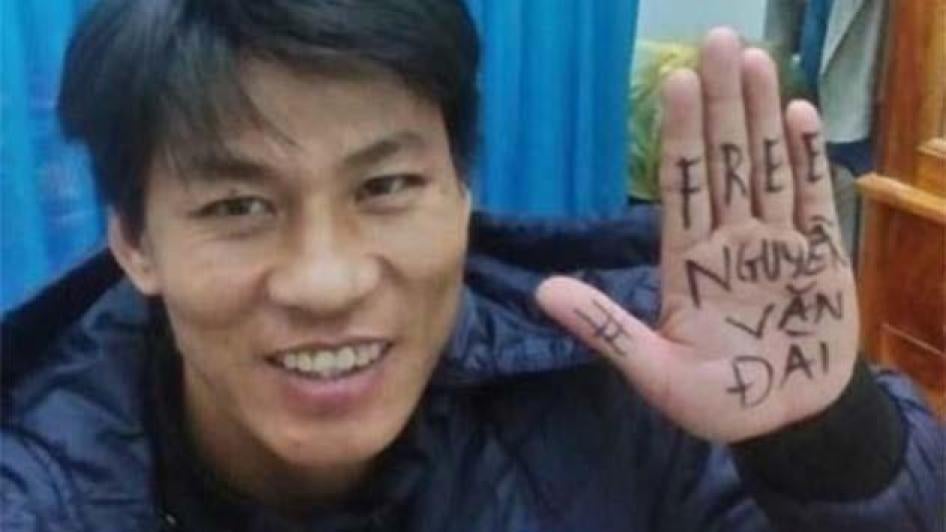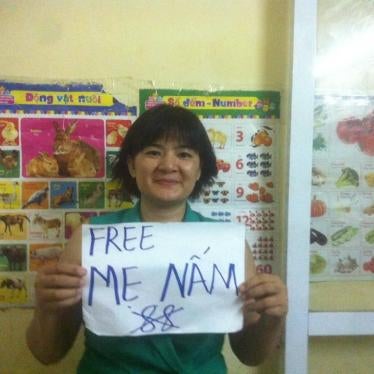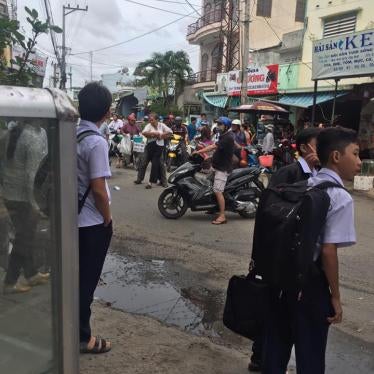(New York) – Vietnam should drop charges of violating probation against the veteran human rights activist Nguyen Van Oai and allow him to go home, Human Rights Watch said today. The People’s Court of Nghe An province will hear his appeal on January 15, 2018.
Nguyen Van Oai was sentenced in September 2017 to five years in prison for violating the terms of his probation, under article 304 of the penal code, and resisting a person on public duty, under article 257 of the penal code. His probation, which required him to report to a People’s Committee regularly and restricted his movements, was based on an improper prosecution and conviction for his association with a disfavored political organization, in violation of his rights to freedom of association and expression.
Nguyen Van Oai, who maintains that his underlying conviction was unlawful, refused on release from prison to report on his activities and thoughts to a People’s Committee and participated in protests during this time. When plain-clothes officers, who did not produce credentials, approached his house to discuss his alleged probation violation, Nguyen Van Oai chased them away with a gardening stake.
“The government’s pursuit of Nguyen Van Oai is vindictive and unwarranted,” said Brad Adams, Asia director. “He never should have been sentenced in the first place, and the terms of his probation amount to a direct effort to control his thoughts and freedom to criticize and protest. This is the latest extension of the government’s unrestrained crackdown against dissidents.”
Nguyen Van Oai, 36, has long participated in anti-China protests and protests against the imprisonment of other activists. He was also involved in mobilizing support for the prominent lawyer Cu Huy Ha Vu at the time of his 2011 trial. Nguyen Van Oai also participated in labor rights activities in Binh Duong province.
Police arrested him in August 2011 at Tan Son Nhat airport after a trip abroad for affiliation with the outlawed political party Viet Tan. The police charged him with “carrying out activities aiming to overthrow the people’s administration” under article 79 of the penal code. In January 2013, the People’s Court of Nghe An put him and 13 other Catholic and Protestant activists on trial, sentencing Nguyen Van Oai to four years in prison.
In August 2015, Nguyen Van Oai completed his prison sentence. Upon release, he told BBC Vietnamese that he planned to “work with organizations that care about human rights in Vietnam so that the country will soon have a real democracy.” He participated in multiple protests against the Taiwanese steel company Formosa, which had caused a massive marine disaster by dumping toxic waste along the central coast of Vietnam in April 2016.
More than 100 activists are currently imprisoned in Vietnam for exercising their basic freedoms of expression, assembly, association, and religion. Vietnam should unconditionally release them and repeal all laws that criminalize peaceful expression.
“Nguyen Van Oai and many other brave Vietnamese risk their personal safety and freedom to advocate for democracy and human rights,” Adams said. “International donors and trade partners should pressure Vietnam to end its long abusive rights record.”










